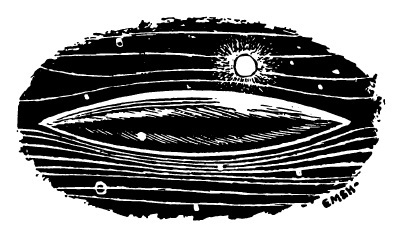
by Gideon Marcus
The Future
Over in England, they're swimming in science fiction anthology-esque shows, from Out of the Unknown to Doctor Who. What have we got Stateside? Lost in Space? My Favorite Martian? Ever since The Outer Limits and The Twilight Zone went off the air, TV has been something of an SF wasteland. That may all be changing come Fall.

A new show, called Star Trek is supposed to be kind of an anthology/serial — the same crew every week, but wildly different stories, many by actual science fiction authors. It could end up being like Voyage to the Bottom of the Sea or Forbidden Planet (i.e. pretty but dumb), or it could be the revolution necessary to bring science fiction to the masses. We won't know for another four months. I'm prepared for disappointment, but I also can't help being a little excited.

The Present
Until then, I've got a pocket full of futures right hear in front of me with this month's Fantasy and Science Fiction. As usual, it's a grab-bag of good and ho-hum, the latter in greater proportion… but whaddaya want for four bits?
Dig it:

by Hector Castellon
This Moment of the Storm, by Roger Zelazny
Zelazny has made a name for himself with his fantastic but punchy prose, sort of an SFNal Hemingway, the vanguard of the American New Wave. For me, he's hit or miss, though his hits are worth waiting for. Storm looked like it was shaping up to be a hit, but I'd say it's a near miss.
Dozens of light years from Earth lies Tierra del Cygnus, a rustic "stopover" colony where folks on decades-long STL interstellar trips can break out of hibernation and stretch their legs before embarking for their final destination. Our protagonist, Godfrey Justin Holmes, is a Hell Cop, responsible for civic peace and weather safety with his 130 floating, autonomous metal eyes. He'd settled on Cygnus after fleeing a tragic personal loss, and on Cygnus, he believes he has found the key to mending his heart.
But in the midst of solving this long term problem, an acute short term one arises: the biggest storm his area of the planet has seen in recorded history is brewing. And for a week, it lashes with unabated fury.
I have the same problem with Storm that I did with Keith Roberts' Lady Anne: I'll be reading right along, enjoying the evocative prose, but after a few pages, I find myself wondering, "What the hell is all this? Get to the point, man!" Pretty writing isn't enough.
Beyond that, Storm feels utterly conventional. Take out the spaceflight trappings, which is easy to do as they are not central to the story, and you've got a thoroughly terrestrial story.
It's not bad, mind you. Zelazny does a masterful job of introducing the world and the relevant considerations in subtle snatches of detail rather than a single burst of exposition. Others might also enjoy the blunt, first person perspective; I eventually found it a little tiresome and too reminiscent of the better …and call me Conrad.
So, a minor work from a major player. Three stars.
The Little Blue Weeds of Spring, by Doris Pitkin Buck
A winged woman commits the horried crime of breeding outside her caste. Her punishment is exile to ground-bound humandom on Earth. But a plucked bird can still find ways to soar…
A nice poetic piece that's perhaps a bit too trivial. Three stars.
Care in Captivity Series: Tyrant Lizards Tyrannosaurus Rex, by Barry Rothman
This is one of those non-fact pieces, in this case, about raising a tyrant lizard what had been frozen for 70 million years. Very slight stuff. Two stars.
The Adjusted, by Kenneth Bulmer
A pair of caretakers mind the last vestiges of humanity, locked in cages, fed porridge, clad in rags, but hypnotized to think they are leading fulfilling lives. It's all part of the computers' plan, you see — a way of dealing with the hordes unemployed and pointless humans. They can't just be killed off, but they also can't be left to their own chaotic devices.
Of course, there's a sting in the story's tale, one that you'll see a mile away. It's not very clever, at first, but there's something compelling about a world of humans under the thrall of machines, all living in a shared fantasy world, slave to some sinister but inscrutable purpose.
It might make an interesting movie someday. Three stars.
Migratory Locusts, by Theodore L. Thomas
Thomas suggests that since locusts are just grasshoppers that get too crowded together, maybe humans will turn into something else altogether when Indian/Chinese conditions become the worldwide norm. I suppose there's an SF story in there somewhere. In this case, there's not enough here here to provoke much thought.
Two stars.
Memo to Secretary, by Pat de Graw
Pat de Graw offers up an ode to bureacratic paperwork, Stone Age style. Nicely done, particularly the line about the wing/ed/itorial bull.
Four stars.
A Quest for Uplift, by Len Guttridge
A carny agent out looking for freaks in a world where access to health care has largely addressed unwanted deformity follows a tip that leads to a genetic lineage of true levitators.
Unfortunately, elevation turns out to be involuntary — and communicative.
Guttridge's narrator tells the story in an unbroken harangue that will glaze your eyes over by page three. It also manages to be casually and offputtingly offensive several times over.
One star.
Forgive Us Our Debtors, by Jon DeCles
Ah, but then we have a rather sublime tale of an empath whose job is planetary evaluation. On the world of Red Kitra (a fine name), said empath is tasked with attuning to a world's entire ecology to determine if the glimmer of sentience lies therein. He ends up in a literal and metaphorical web of karma, learning the value of life, as well as the meaning of charity, in the process.
I may be a little biased as I happen to be friends with Jon, but I think this is inarguably the best piece of the issue. Four stars.
The Isles of Earth, by Isaac Asimov
Another list article from Dr. A, this time on the size and distribution of Earth's islands. Diverting, I suppose, but nothing you won't find at the beginning of any decent atlas (of which I have about two dozen — I like atlases!)
Three stars.
The Pilgrims, by Jack Vance
We wrap up with the penultimate tale of the ordeals of Cugel the Clever, hapless magical errand boy in the far future setting of The Dying Earth. As related in prior episodes, this is a set of stories that gets less appealing as it goes on, though Vance does mix in some amusing literate ribaldry.
This particular installment doesn't even have a proper ending. Let's hope the series as a whole does.
Three stars.
The Edge of Tomorrow
All told, the latest F&SF merits a drab 2.9 stars, definitely one of the weaker entries of the past year. But every month offers a chance at redemption, and the next issue is only a few weeks away. Will the July issue offer a collection of immortal classics or more of the humdrum same?
The anticipation, waiting to find out, is half the fun!
While you're waiting, tune in to KGJ, our radio station! Nothing but the newest and best hits!

![[May 20, 1966] Things to Come and Things that Are(June 1966 <i>Fantasy and Science Fiction</i>)](https://galacticjourney.org/wp-content/uploads/2021/05/660518cover-669x372.jpg)


![[April 16, 1966] Non-taxing (May 1966 <i>Fantasy and Science Fiction</i>)](https://galacticjourney.org/wp-content/uploads/2021/04/660416cover-664x372.jpg)





![[March 22, 1966] Summer in the sun, winter in the shade (April 1966 <i>Fantasy and Science Fiction</i>)](https://galacticjourney.org/wp-content/uploads/2021/03/660320cover-672x372.jpg)



![[February 18, 1966] Fixing up the old place (March 1966 <i>Fantasy & Science Fiction</i>)](https://galacticjourney.org/wp-content/uploads/2021/02/660218cover-672x372.jpg)








![[February 10, 1966] Within and without (Isaac Asimov's <i>Fantastic Voyage</i> and Samuel R. Delany's <i>Empire Star</i>)](https://galacticjourney.org/wp-content/uploads/2021/02/660210cover-672x372.jpg)
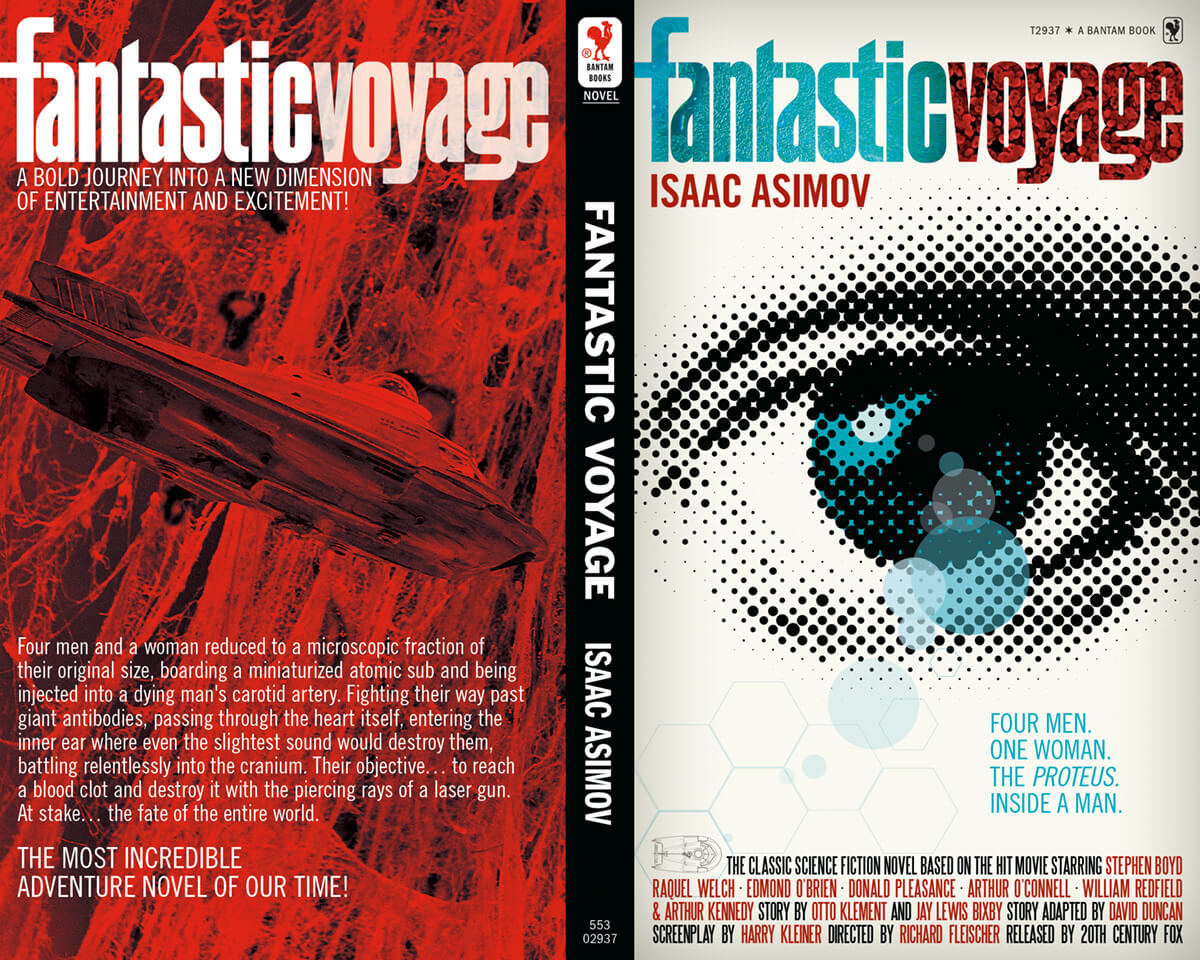


![[January 20, 1966] Bombs, duds, and happy endings (February 1966 <i>Fantasy and Science Fiction</i>)](https://galacticjourney.org/wp-content/uploads/2021/01/660120cover-565x372.jpg)

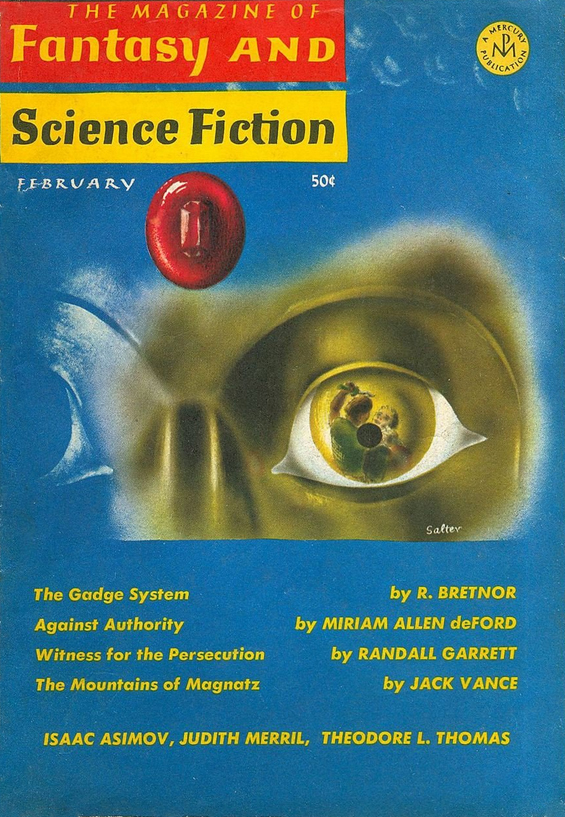
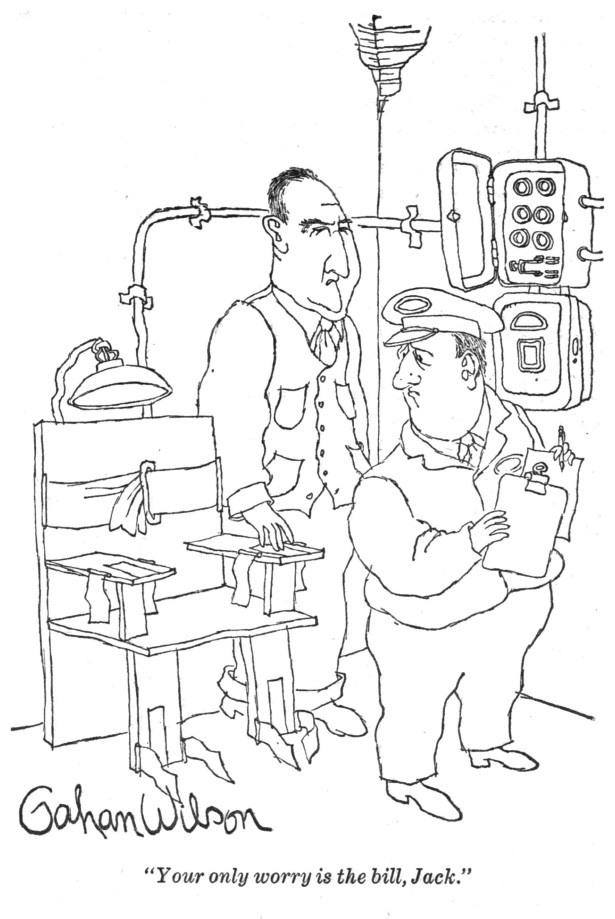
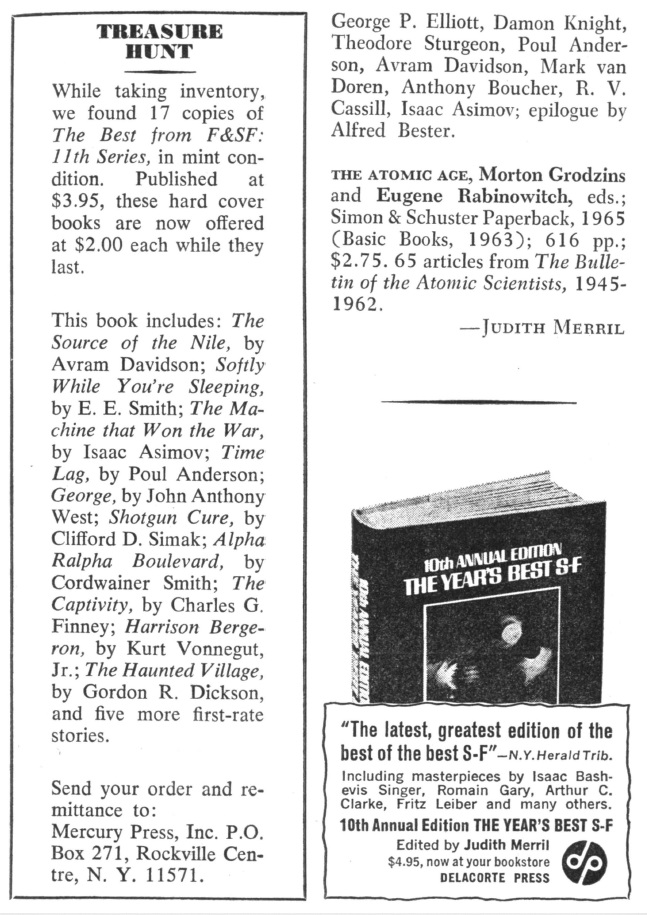
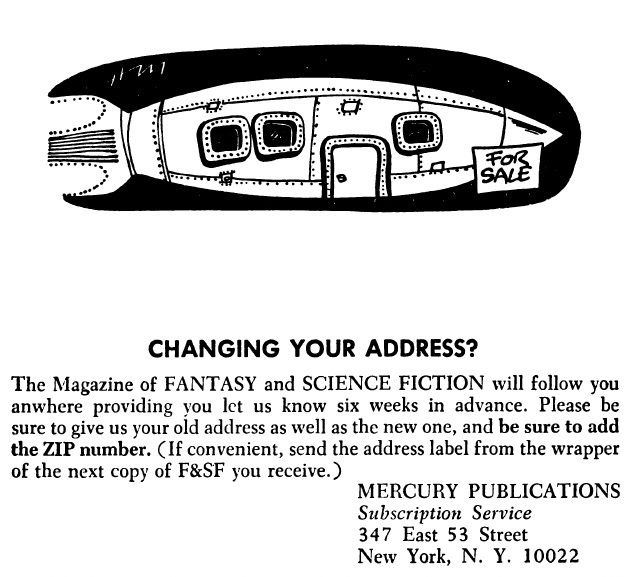
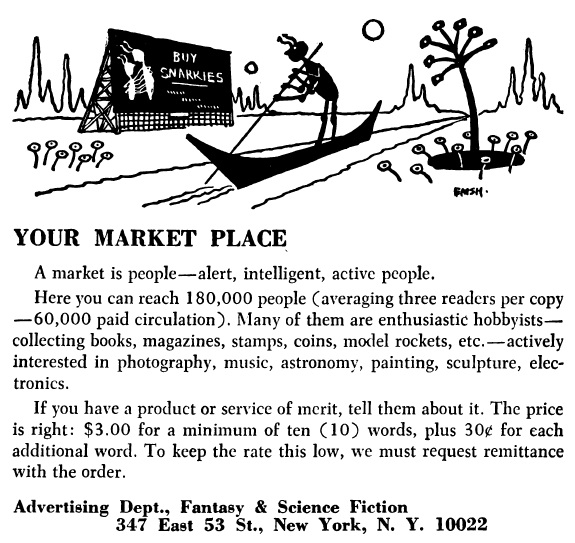
![[January 18, 1966] New Discoveries of the Old (<i>Out of the Unknown</i>)](https://galacticjourney.org/wp-content/uploads/2021/01/Out-of-the-Unknown-Titles.jpg)



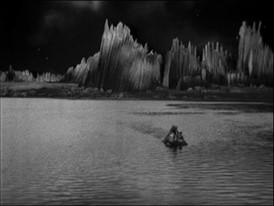

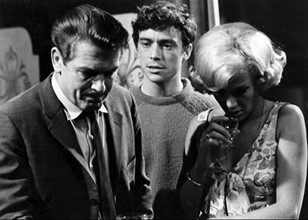


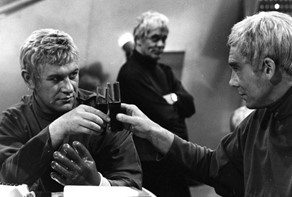

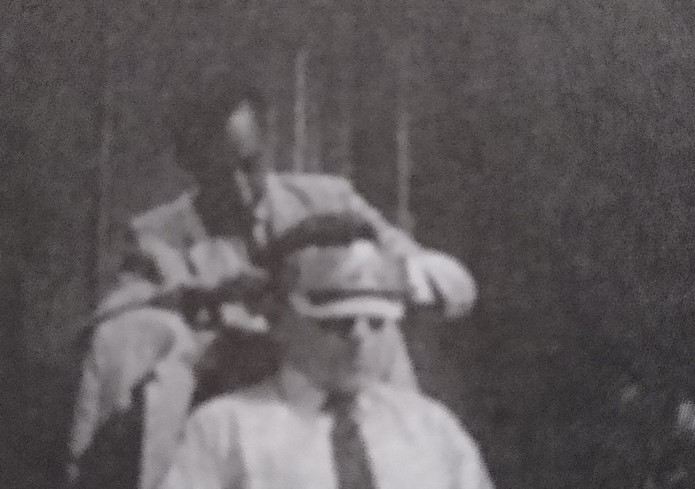




![[December 18, 1965] Bulges and Depressions (January 1966 <i>Fantasy and Science Fiction</i>)](https://galacticjourney.org/wp-content/uploads/2020/12/651216cover-672x372.jpg)





![[November 20, 1965] A fine cup of coffee (December 1965 <i>Fantasy and Science Fiction</i>)](https://galacticjourney.org/wp-content/uploads/2020/11/651120cover-672x372.jpg)




![[October 18, 1965] Turn, Turn, Turn (November 1965 <i>Fantasy & Science Fiction</i>)](https://galacticjourney.org/wp-content/uploads/2020/10/651018cover-672x372.jpg)





